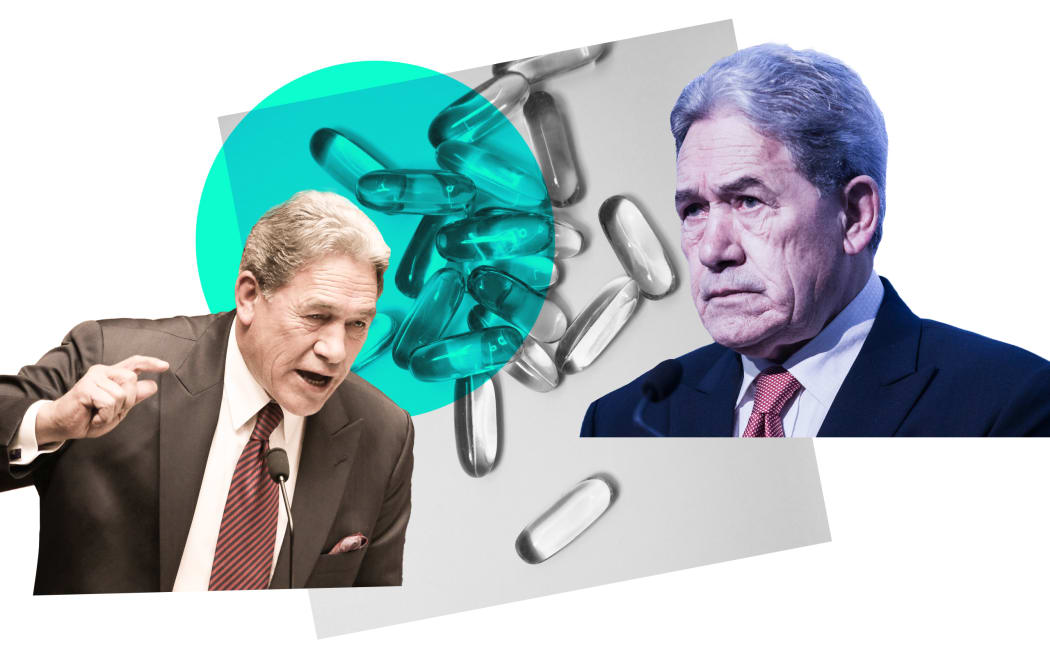
Photo: Unsplash / RNZ
NZ First enjoys the financial and political support of a section of the natural health sector. They're celebrating again as the party takes a renewed interest in regulation of the industry.
In a packed hall with winter light pouring through floor to ceiling arched windows, Winston Peters shares a personal story. The heavy smoker suffered from severe asthma as a child. To treat it, "I had to eat comfrey every day," he says.
"I ceased being asthmatic and got over it really fast because I stuck to this natural recipe."
It's unlikely there was scepticism in the room at the claim comfrey - a mineral-rich plant - cured his asthma. The May 2023 meeting has been organised by the Natural Health Alliance whose members and supporters champion the use of natural products to prevent and cure ills. Peters, with his well-known penchant for whiskey and cigarettes, may seem like an odd fit in the roomful of 200 natural health proponents but he's here at their invitation.
The audience is concerned the Therapeutics Products Bill will impose regulations on natural health products, which could make them harder to buy. Peters has been credited as the handbrake on previous attempts at regulating natural health products in 2007 and 2017.
"This bill is going through parliament with Labour, Greens, National, ACT party supporting it. This is dumbfounding stuff," the NZ First leader says. "Is it because these people are globalists?" There's applause from the audience.
The election, at this stage, is five months away and NZ First has been polling consistently below the 5 percent threshold needed to make it into parliament since 2020. Peters tells the audience he's on their side.
"Rust never sleeps, and they never give up," he warns. "We've got to be on the case all the time, because they will never go away until one day, they think they can get the thing sneaked through."
He suggests many attendees aren't on the electoral roll.
"These people [other politicians] are controlling your lives. I suggest you get on the roll and do something about it. It's in your hands."
An advertising campaign would be pointless, he says.
"You'll spend a lot of money and it won't have any effect at all. Or you can organise an army of people who will make this an issue at the 2023 election.
"Now this is not a political meeting, it's a meeting about medicine. But as a good book says: By their deeds you will know them."
A consummated marriage
Gary Moller is another speaker at the same meeting. The natural health practitioner is a familiar face in the so-called "freedom movement" and has long agitated for some form of political representation, regularly posting strategies on his website, including backing an existing party.
Initially, ACT seems to be Moller's lead contender as its constitution looked like it had been "written with us in mind," he writes in a blog post. However, its leader David Seymour "was going to be a challenging hurdle to leap".
When news that Winston Peters was back in the game comes "we swapped horses", Moller continues. Peters' acceptance of an invitation to speak at the May meeting which Moller says he organised under the banner of the Natural Health Alliance was pivotal.
"Henceforth, the marriage was agreed upon and consummated," Moller concludes.
It's a marriage with perks for NZ First.
The Natural Health Alliance, the industry group which Moller is a member of, registered itself as an election third party promoter. From August, it and the S.B. Group (which Moller is aligned with) ran numerous full page advertisements in the New Zealand Herald urging people to vote for NZ First.
Between May and August, NZ First's "2023 commitments" webpage grew from seven bullet points to 31. Bullet point number 9 is: "New Zealand First will repeal the Therapeutic Products Act."
Did the advertising campaign help get NZ First into parliament?
"I would like to think so," says Natural Health Alliance chairperson Paddy Fahy. "They were a party that was thrown out of government in the last election. To make a comeback like they did was astonishing."
National and ACT both voted against the Therapeutics Products Bill and members of both parties talked about repealing or replacing the bill should they gain power in the 2023 election. But Fahy says he wasn't sure they were committed. "I'm old in the tooth. Unless somebody gives me something in writing these days, words are just hearsay."
NZ First, though, did include repeal of the bill in its campaign materials.
He's not sure how much the Natural Health Alliance spent on advertisements promoting NZ First, but when numbers are thrown at him Fahy suggests each full page advertisement cost closer to $10,000 than $5000.
"It wasn't cheap. We wouldn't have been throwing money at advertising if I didn't think that we were backing the right horse," says Fahy.
From August, NZ First shot up the polls. Its election result of 6 percent returned Peters to the kingmaker position. Repealing the Therapeutics Products Act was among the party's wins, appearing not only in the coalition agreement, but in the government's 100-day-plan.
ACT's coalition agreement with National also includes a call to repeal the Therapeutics Products Act, although its support isn't mentioned by Moller or Fahy.

There are two very different views within the sector on regulation of natural health products in New Zealand Photo: 123RF
The bill and the battle of importers against exporters
The bill which inspired the Natural Health Alliance's advertising campaign was passed into law in late July, with the votes of Labour, the Green Party, and Te Pāti Māori. It is a wide-ranging bill covering everything from medicines, to medical devices to vitamins and supplements. For natural health products it meant new rules were set to kick in from September 2026.
These would spell major changes for the natural health industry, including new compliance costs.
For some, like the Natural Health Alliance, the passing of the bill is a bitter pill to swallow but for others in the industry it's a triumph after a battle stretching back to 2003.
You can roughly divide the natural health industry into two groups who want different things.
There's Fahy's group, the Natural Health Alliance, which mainly represents importers, sellers and practitioners. It estimates 75 percent of the products its members sell are imported and 25 percent made locally. It's mostly happy with how things were before the bill was passed.
The other group is made up of a broad range of companies including manufacturers and exporters, represented by Natural Health Products New Zealand. It says its membership accounts for around 80 percent of the natural health sector and is worth around $2.3 billion to GDP each year. The group's government affairs director Samantha Gray says the organisation was especially keen for a clause in the bill which would allow natural products to make evidence-based health claims.
At present, natural health products fall under the Food Act. Manufacturers are not allowed to say a product can help treat a condition even if there is evidence it can. Instead, they can say a product "supports" something.
She says this puts New Zealand products on the backfoot in the export market when they're competing against products which can make claims. Her estimate of the impact is large. "It's severely constraining exports to the tune of half a billion dollars in lost export earnings each year," Gray says.
Fahy's group's members don't want to make evidence-based claims on labels, he says. "A small number of overseas-owned multinational companies want to make evidence-based claims in order to patent products and corner the market." He believes this will force smaller local players out.
Gray says this is way off the mark, pointing out patents are incredibly hard to secure and can only be granted if something is completely new. Patenting an ingredient which has traditionally been used as a supplement for decades just couldn't be done.
There's another issue for Fahy's group in the Therapeutic Products Act. It will require each product sold to be registered, with an annual fee attached. Although final figures hadn't been set, he says there was an estimate at one stage of around $800 per year per product. Fahy thinks regulatory creep would see it end up closer to $1000 per product.
"Now just for example my company, we have 250 products just in one brand we bring in from the USA. To register those products per year will cost me $250,000."
Smaller companies wouldn't be able to meet the compliance costs and would be forced to cull product lines, says Fahy. This belief appears to form the basis of the argument that the public's ability to access natural health products would be restricted by the act.

Photo: Unsplash / RNZ
2007: The first rodeo
While Peters' attendance at the May meeting "consummated a happy marriage" for the party and the Natural Health Alliance, there's another reason Fahy backed NZ First's polarising leader. "Winston Peters is Winston Peters, you either like him or you don't, but he stood by our industry two or three times."
The history of NZ First's positions on the industry are a little more complicated than Fahy suggests, however. At various points, the party has supported and opposed regulation.
From 2003 to 2007 there was a move to 'harmonise' the way natural health products are treated in Australia and New Zealand. A trans-Tasman regulatory scheme was proposed which would cover the manufacturing, import and export of therapeutic products, as well as setting and enforcing regulations for how they were promoted.
Initially, NZ First was against the bill, but after a provision to cut compliance costs by 50 percent was included and the number of Australian ministers in the overseeing council was reduced to one, it was in support. Peters was met with jeers from a crowd on parliament's forecourt and refused to accept a box of printed emails from people opposed to the bill, berating their bad manners. He argued the updated version of the bill was dramatically different to what he'd initially opposed.
The bill squeezed through its first reading by a single vote but floundered in the select committee when two independent MPs withdrew support.
Peters then proposed a further amendment he believed would generate "overwhelming political support". But it too was criticised by the NZ Health Trust's David Sloan as a trojan horse for regulation in the long term. Sloan warned New Zealand First's support for the bill could come at a cost to the party.
"NZ First has no sympathy for the 2.6 million New Zealanders that use natural products to stay well. Many thousands of these consumers are his voters. He would do well not to forget that."
With the Green Party, National and ACT as well as the independent MPs against the bill it failed to gain the support it needed to make it over the line, even with Peters' suggested amendment.
Still, Peters claims this episode as an instance where he stood against and stopped ill-conceived regulation. In a September 2023 campaign interview with Peter Williams he referred to it: "I stopped it then and I stopped it in 2017 and 2020."
This claim is echoed in newspaper advertisements the Natural Health Alliance publishes in the New Zealand Herald in the lead up to the 2023 election which read: "New Zealand First stood up for the natural health products industry in 2007 and 2017 by stopping similar legislation."
When asked by RNZ if NZ First maintained it was responsible for stopping regulation in 2007, it issued a written statement which said: "We have consistently stood up for natural health products since 2007."
2017: The second attempt
Four years later, another attempt was made. The Natural Health and Supplementary Products Bill introduced in 2011 by then-Minister of Health, Dr Jonathan Coleman, aimed to establish regulation for natural health products, including requiring evidence of efficacy.
Again, NZ First voted more than once in favour of the bill. At second reading, the bill got support from every MP in Parliament except for the solitary opposition of ACT MP John Banks.
NZ First's health spokeswoman at the time, Barbara Stewart, said it would help consumers know the products they were buying contain what the label says they do. She also talked about the importance to exporters: "We believe that an exporter-driven economy is absolutely paramount. Overseas buyers need to have confidence in these products. New Zealand First is very happy to support this bill."
However, from the second reading in 2013 the bill languished for years. In May 2017, Peters signalled a change of heart, now calling the bill an embarrassment and saying it should be scrapped.
"The more New Zealand First looks into it, the more we realise the Natural Health Products Bill is a solution looking for a problem," Peters said.
After the September 2017 election, NZ First was in power with Labour and the bill disappeared from view.
The spokesperson for Natural Health Products NZ at the time said she had written to the government asking for an explanation: "Clearly our next steps will be to follow through with that, and find out which party in the coalition wanted it withdrawn and why, and what we can do to change their mind."

Photo: Unsplash / RNZ
Donations to NZ First by the industry
In 2020, it became clear NZ First received a number of donations from the industry in 2017 and 2018.
RNZ has previously revealed a number of donations were made to the New Zealand First Foundation. These donations were not declared, despite some of them exceeding the $15,000 anonymity threshold for political party donations.
A Newsroom report on the court case which followed the revelations shows the natural health product industry was a generous donor to the foundation from June 2017.
Adam Ryan, the managing director of Nutrisearch gave $6500 through a combination of one larger donation and weekly donations of $50. Daniel King, former owner of About Health Supplements, gave $12,500. Paddy Fahy, the chairperson of the Natural Health Alliance, gave $2500.
NZ Health Trust's David Sloan, who had previously warned Peters that forgetting natural health users could cost votes, donated $5000 in July 2018.
In total, industry players donated $26,500 to the foundation from 2017 to 2018. All cite a concern at the proposed regulations as a reason for their donations. When asked if the industry's financial support had impacted its stance on regulating natural health products, NZ First said it appreciates "any support provided".
2023: What now?
With NZ First out of the picture and Labour governing alone after the 2020 election, reforms finally passed into law in July 2023.
But with the act up for repeal once again, Natural Health Products NZ is asking questions of the government.
"We are going to be urgently requesting meetings with the ministers of health and trade to find out what's going on and what the intention is," says government affairs director Samantha Gray.
Her view is that amendments could be made to the act to remove some of the sticking points, rather than throwing it out and leaving an estimated $500m in export earnings for the sector on the table.
New Trade Minister Todd McClay told RNZ he believes there are big opportunities to grow the export sector, but concern for local consumers meant the bill needed to be repealed.
"Unfortunately, the Therapeutic Products Act as it was passed by the previous Labour Government makes it harder for New Zealanders to have access to natural products and places unreasonable restrictions and cost on smaller manufacturers." He says he plans to work closely with manufacturers.
Health Minister Shane Reti confirmed the government is moving forward with repealing the act and will be working closely with officials on the next steps.
Associate Minister for Health, NZ First's Casey Costello, did not respond to RNZ's requests to talk about the act.
Former Health Minister Ayesha Verrall says she knew there were some MPs who had issues with the bill when it went through the house. She thinks amendments could have satisfied concerns. "But the wholesale repealing of the bill seems over the top."
The Natural Health Alliance's Paddy Fahy says he's heard murmurs of what might be next, including talk of natural health products remaining under the Food Act, but shifting to sit under the Ministry for Primary Industries, "certainly taken out of the hands of the Ministry of Health".
Natural Health Alliance member Gary Moller is ecstatic. In a blog post titled "Pop the corks, the coalition deal has been signed" he boasts: "Our main focus was to have the Therapeutic Products Act thrown out: We achieved that and a whole lot more as a bonus!"
Moller's post says he's been inundated with messages of thanks. He includes one from someone called Marie, who closes her note with, "Thank Goodness for Winston."


